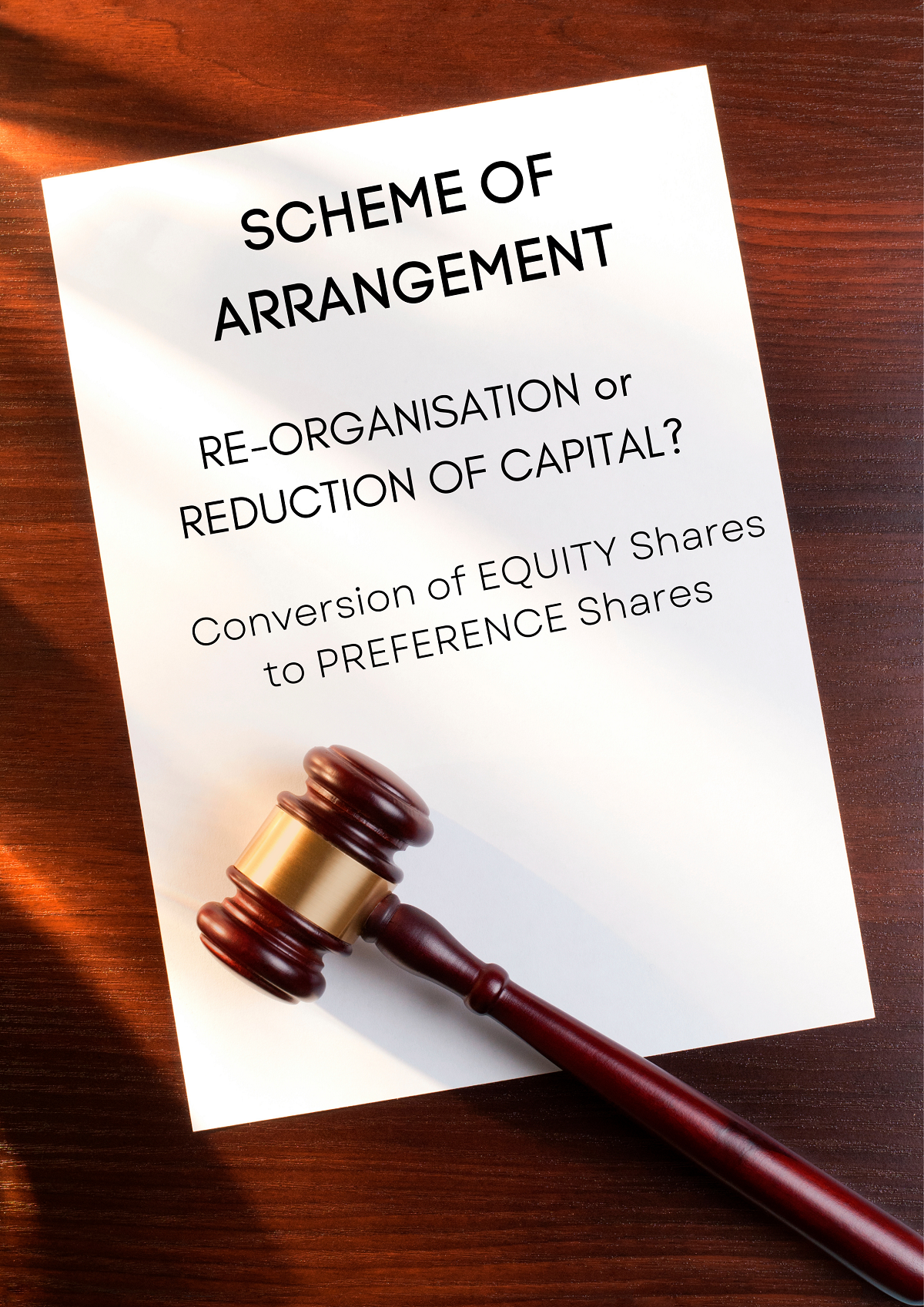Baramati Agro Limited (Transferee Company) along with the Protrans Supply Chain Management Private Limited (Transferor Company 1) and Ag-Vet Genetics Private Limited (Transferor Company 2) sought the sanction of National Company Law Tribunal, Mumbai Bench to the “Scheme of Amalgamation” and “Arrangement” as a part of one scheme under Section 230 of the Companies Act, 2013.
Highlights Of the Scheme
- As a first part, the scheme provides for merger of Transferor Companies with the Transferee Company pursuant to Sections 230 to 232 and other relevant provisions of the Companies Act, 2013 and other applicable provisions.
- In second part, the scheme provides for conversion of ‘Series A’ equity shares of Transferee Company into 9% Non-Cumulative Optionally Convertible Redeemable Preference Shares (NCOCPRS) of those Equity Shareholders as on record date fixed by the Company who are holding 250 or a smaller number of equity shares. The rationale for the same as mentioned in the scheme is to give better liquidity and returns to small shareholders and in fact it is being done at the request of some small shareholders.
As on 31st March 2019, Company has 3,60,59,649 “Series A” Equity shares of Rs. 10 Each. 52,48,614 ‘Series A’ (14.55 %) Equity Shares of Rs. 10/- each (held by shareholders holding shares less than 250 each) would be converted in to 52,48,614 9% fully paid-up Non-Cumulative Optionally Convertible Redeemable Preference Shares of the face value of Rs.10/- each.
Terms and conditions of 9% Non-Cumulative Optionally Convertible Redeemable Preference Shares will be as follows –
| Sr No. | Particulars | Details |
| 1. | Face Value | Rs. 10 |
| 2. | 2.Term | 10 Years |
| 3. | Redemption | Early Redemption is possible at the option of the Company only. Company may redeem shares as it may think fit in one or more installments at a price which would be at least equal to the face value of the shares or at premium at the option of the Company. |
| 4. | Conversion | The conversion of the shares will be at the option of the company and may be suitably decided by the company. The terms may be decided and modified as per the necessity. The each NCOCRPS of Rs.10/-each shall be converted into 1(one) Equity Shares (Series A) of Rs.10/-each at the option of the Company |
We try to analyse the decision of The Honourable NCLT in respect of arrangements with the small shareholders of the Transferee Company and taxation implication of such conversion through the scheme of arrangement under section 230 of the Companies Act, 2013.
Objections By the Regulatory Authorities: –
After filing scheme of merger with the Regulatory Authorities, Regional Director (RD) filed a report based on the report issued by the Registrar of Companies (ROC) where RD has mentioned that except the point stated by ROC in his report, the scheme is not prejudicial to the interest of shareholders and public. No other regulatory authorities like Official Liquidator, Income Tax Authorities have filed any objection against such conversion.
Against the conversion of Equity shares to Preference shares, ROC mentioned following points in the report submitted to RD –
Equity and Preference shares are different: –
Conversion of equity shares into preference shares is not permissible as its value, terms, rights are different and cannot be termed as the same kinds of shares.
MCA Circular: –
Pursuant to circular issued by the MCA, conversion of equity shares into preference shares and vice versa was rejected by ROC, Delhi and hence such conversion may be considered undesirable.
Scheme is placed before members of the transferee company having only 48.45% of the value which is not representing the majority.
Response by The Transferee Company
Shares remains shares only
Both equities share capital and preference share capital appear in the balance sheet under “Share Capital” and as per provisions of Section 43 of the Companies Act 2013 there can be only two classes of shares viz. Equity and Preference and combination of two depict the total share capital. Conversion equity to preference shares or vice versa will not have any impact on the paid-up capital of the Company, only nomenclatures will get changed.
Every procedure under the Act is permissible unless prohibited by the law –
Transferee Company referred the decision passed by the Apex Court in Special Leave Petition in Rajendra Prasad Gupta V/s Prakash Chandra Mishra & Ors. where the court held that Courts are not to act upon principal that every procedure is to be taken as prohibited unless it is expressly provided for by the Code, but on the converse principal that every procedure is to be understood as permissible till it is shown to be prohibited by the law. As a matter of general principal prohibition cannot be presumed.
Inclusive and wide meaning of word “Arrangement” –
Under section 230 of the Companies Act, 2013 scheme of compromise or arrangement is referred and “Inclusive” definition of word Arrangement is given under the said section.
In the judgment passed by Apex Court under Regional Director, Employees State Insurance Corporation V High land coffee works of P.F.X Saldhana & sons 1991 it is stated that, when a word is defined to mean something, the definition is prima facie restrictive and where the word defined is declared to include a particular meaning the definition is prima facie extensive or inclusive.
Transferee Company emphasized that conversion of one type of shares into another is not barred by any provision of the law and such conversion only amounts to reorganization of share capital of the Company which is permissible under section 61 of the Companies Act, 2013. Further, scheme of compromise or arrangement may involve any type of reconstruction of share capital of the Company.
- Hon’ble High Court in Vasan Investment Corporation Limited CA No. 178 of 1978 where it was held by the court that every alteration of the memorandum of association required under a scheme of compromise or arrangement cannot be looked upon as an ultra vires act. Under section 391 of the Companies Act, 1956 (Now Section 230 of the Companies Act, 2013) the court has very wide power of reconstituting the Company. Purpose of the scheme of reconstruction is to make suitable alterations in the structure of the Company to enable it to make function. Scheme can be sanctioned by the courts even if it is ultra vires to the provisions of the Chartered Documents of the Company
- The Division Bench of Punjab & Haryana High Court in the matter of Q.H Talbros Ltd. inter-alia observed that the term arrangement used in section 391 of the Companies Act, 1956 is of wide amplitude. Scheme of Arrangement required considerations of various enactments and adherence to various legal provisions not only under the Companies Act but also under other enactments. Various components from laws can constitute one composite scheme/arrangement under the section 391. The legislature, therefore, advisedly did not restrict scope of the term arrangement by defining it. A view to the contrary would place an unwarranted fetter upon the activities of a company and restrict the choice of its members, creditors, debenture holders and other stakeholders.
Administrative Instructions are not binding on the Courts
With regard to letter referred by the ROC, Transferee Company referred that as per the settled principle by the Hon’ble Supreme court in several cases the Government’s clarification and circular are merely for the understanding of the statutory provisions and are not binding on quasi-judicial authorities and hence the said letter cannot be binding on the court or Tribunal unless the same are made part of substantive law or delegated legislation.
After taking into consideration report issued by the Registrar of Companies and the reply filed by the Transferee Company, Regional Director in its supplementary report stated that Regional Director is not convinced with the reply filed by the Transferee Companies with regard to MCA letter refereed by the ROC Pune viz. letter no, 03/08/2019. CL V dated 27th July 2020. Transferee Company also filed the affidavit in rejoinder.
Comments By NCLT
Considering the wider impact of allowing conversion of equity shares to preference shares NCLT asked for the comments from Ministry of Corporate Affairs (MCA) and RD for their comments on the proposed conversion and provided a chance to submit written submission to the Transferee Company.
NCLT in its order has mentioned that the clarifications and undertaking given by the Transferee Company are accepted.
Why conversion of equity shares into preference shall not be considered as capital reduction under section 66 of Companies Act, 2013?
Section 66 of the Companies Act, 2013 dealing with reduction of capital of the Company allows the company to reduce the share capital “in any manner”, hence there may be reduction of share capital even without payment of any money to the shareholders.
In Brillio Technologies, the NCLAT (National Company Law Appellate Tribunal) held that the manner of reduction of capital provided in Sections 66(1)(a) and 66(1)(b) of the Act is a mere illustration and is not the only manner in which a company may reduce its share capital.
Reduction of capital can also be done through section 230 of the Companies Act, 2013. If the capital reduction is done through section 230, companies are not required to follow the procedure given under section 66.
In this scheme of arrangement, even though the equity shares are getting converted paid-up capital amount is remaining the same hence the same cannot be considered as a reduction of capital.
What can be the other alternatives instead of conversion of equity shares into preference shares?
Transferee company could have also considered other options like conversion of equity shares into unsecured loan or debentures considering wide meaning of term “Arrangement” through the scheme of arrangement with the shareholders under section 230. Transferee Company might have not selected these options because of the reasons like stricter provisions applicable for the public company on the amount of loan to be raised from the shareholders, stringent provisions given under Deposit Rules, effect on the Debt-Equity Ratio etc.
The ratio of the judgement is conversion of equity shares having preferential dividend rights getting converted into non-cumulative optionally convertible preference shares does not amount to reduction of equity share capital under the Companies Act. It is considered as reorganization of paid-up capital hence it falls within the provisions of section 230 of the Companies Act, 2013. The peculiar fact here is that the company has issued new shares of equivalent paid-up capital. However, if one sees optically, though it has shown as optionally convertible but in fact option for conversion is with the company and rights to change the terms of redemption is also with the company as a result it is win-win for the company and it is disadvantageous to the shareholders.
Conclusion
The decision provides for the exit to shareholders under the provisions of section 230 for the shareholders of the transferee company. This part only relates to the shareholders of the transferee company only and hence it is in fact a separate scheme and no way connected on dependant on the first part of the scheme. In fact, the selective reduction of capital though can only be done through the scheme of arrangement under section 230 and not otherwise, but Honourable High Court and NCLAT also allowed selective reduction of capital under section 66 of the Companies Act, 2013 which in our opinion is not within the provisions of the said section. Conversion from equity shares into optionally convertible preference shares may have capital gain implications also on the shareholders.
Many companies have tried various methods to provide an exit to such shareholders through capital reduction, buy-back, reorganisation of share capital etc. Every such method has its own pros and cons like large timeline involved, valuation requirements, approvals from various regulatory authorities, limit on the no. of shares for which exit to be given etc.
With the reference to this judgment, companies may obtain the approval of the NCLT to give exit equity shareholders not only by converting their equity shares into preference shares but by proposing any other arrangement like conversion of equity shares into loan, debentures considering the wider meaning of the word “Arrangement” accepted by the courts/NCLT etc.





Add comment